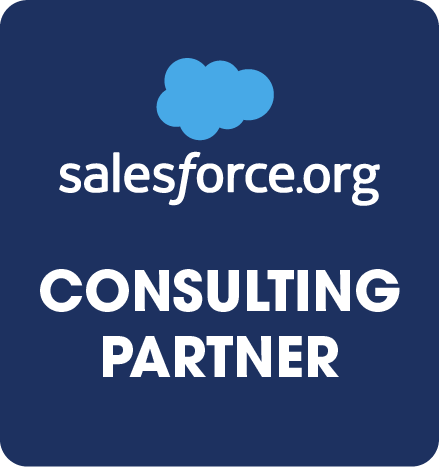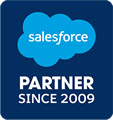The Client
The University at Albany (UAlbany), a leader in educational equity and social mobility, is renowned for its cutting-edge research and diverse academic programs. As a Carnegie-classified R1 institution, UAlbany is driving innovation across fields like artificial intelligence, atmospheric sciences, public health, and social sciences. However, the University’s groundbreaking work doesn’t stop with academics—it extends to fostering economic and technological growth through corporate partnerships.
Unlike many university departments that leverage Salesforce primarily for managing the student lifecycle, UAlbany is using Salesforce as an innovative tool to power its corporate partnership initiatives and to measure economic development impact. The Office of Economic Development, Entrepreneurship and Industry Partnerships and its Innovation and Entrepreneurship Program have embraced Salesforce to better understand and showcase the University’s impact, with an ambitious vision to scale this approach University-wide for a holistic view of their societal contributions.
The Challenge
Before adopting Salesforce, the University at Albany’s Office of Economic Development relied on a web-based platform specifically designed for incubators and accelerators. While this system claimed to offer a variety of features—including CRM functionality, custom reporting, mentoring support, economic impact tracking, and dashboards—it fell short in several areas. The platform was buggy, lacked reliable customer support, and had an unintuitive user interface. These issues, combined with the sudden sunsetting of the software, left the team with a disjointed program management process and no single source of truth.
Lead generation was handled through multiple channels, including the Innovate 518 website, social media, email marketing, word-of-mouth, and networking. However, tracking and managing these leads alongside program data across various tools such as Outlook, Teams, and spreadsheets created inefficiencies and administrative burdens. The University needed a more robust and scalable system to streamline communication, program tracking, reporting, and data management.
With goals of creating a single source of truth, improving efficiency, reducing administrative burdens, and focusing on supporting companies in their incubator programs, UAlbany sought a solution that could meet both its immediate and long-term needs. Their requirements included program tracking, economic impact reporting, project management, and two-way engagement tracking.
The Solution
Since implementing Salesforce, the University at Albany has seen significant improvements in efficiency and data management. Program tracking is now streamlined, and economic impact data is centralized, enabling the Director of Economic Development to tell a cohesive story about the University’s contributions to economic growth. Administrative burdens have been reduced, freeing the team to focus on supporting companies in their programs.
Salesforce’s user-friendly interface and robust features have also helped the team secure buy-in from other campus entities, paving the way for a campus-wide implementation. By consolidating data and creating a unified approach to tracking impact, UAlbany is positioned to better demonstrate its contributions to economic and technological development.
Looking forward, UAlbany aims to expand Salesforce usage across the campus, creating a shared system for tracking and reporting on impact. This initiative will allow the University to gather and present a holistic view of its economic and societal contributions, strengthening its position as a leader in innovation and growth. Working with Redpath not only helped UAlbany realize these goals but also empowered the team to refine their processes and set the stage for continued success.
The Results
The Redpath team’s implementation of the integrated Faculty Feedback system and Salesforce solution at Middle Georgia State University (MGA) yielded significant results in a remarkably short timeframe. Within just two months (August – October), the new system demonstrated its effectiveness in addressing MGA’s communication challenges and enhancing student support.
The Faculty Feedback form generated an impressive 7,266 records for students across 137 courses, with 155 faculty members actively participating. This high level of engagement underscores the system’s user-friendly design and its ability to accommodate faculty’s busy schedules. The solution’s impact was far-reaching, with 3,450 students receiving feedback from faculty for one or more of their courses, addressing the previous gap in information sharing between faculty and students.
Leveraging Salesforce automation, the system issued 2,010 alerts for 1,032 students, ensuring prompt intervention for those needing additional support. These alerts were diverse, including 1,365 grade alerts, 8 general faculty feedback alerts, and 637 attendance alerts, reflecting the system’s capability to address a wide range of student needs. The resolution of 1,235 alerts (61%) to date demonstrates the effectiveness of this innovative approach in facilitating timely, targeted support.
The success of the implementation is further evidenced by the system’s ability to handle large volumes of data efficiently, addressing MGA’s scalability concerns. By centralizing student information and automating alerts, the solution has significantly improved collaboration between faculty, advisors, and students. This enhanced communication flow has enabled more proactive and personalized support, aligning with MGA’s goal of fostering student success.
Moreover, the system’s ability to generate comprehensive data on student progress and challenges has provided MGA with valuable insights for data-driven decision-making. This has allowed the university to identify trends, allocate resources more effectively, and develop targeted interventions to support student success.
The rapid adoption and positive outcomes of this solution showcase the Redpath team’s expertise in implementing tailored Salesforce solutions that address complex institutional challenges. By seamlessly integrating faculty insights with advisor actions and student engagement, MGA has created a robust support ecosystem that can adapt to the evolving needs of its growing student body, setting a new standard for student support in higher education.
Nationally Recognized, Trusted Salesforce Partner










